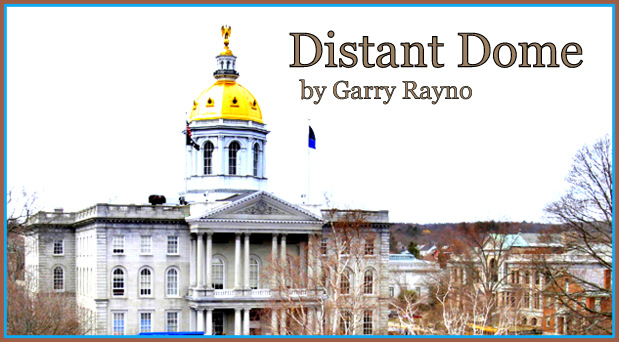
By GARRY RAYNO, InDepthNH.org
CONCORD – The state’s Highway Fund pays for most of the state’s share of road and bridge work, but it is on a collision course with fuel efficiency and alternative fuels.
Most agree greater fuel efficiency and vehicles powered by alternatives to fossil fuels will help reduce pollution and help to slow the world’s march to catastrophic global warming.
While that is good for the environment and future generations, it has created a huge hole in the Highway Fund.
The Highway Fund has two sources of money, vehicle registrations and the gas tax. The number of vehicles registered in New Hampshire has been steadily climbing for years, but gas tax revenues have declined.
Vehicles with greater fuel economy use less gasoline, so despite the increase in tax from 18 to 22.2 cents a gallon on July 1, 2014 — the first increase since 1919 — the Highway Fund today collects less money than it did in 2008.
Last year the fund collected $226.4 million, but took in $249 million in 2008.
Coupled with the rate of inflation over that time period of 20 percent, and the transportation department is only able to do less than 80 percent of the work done more than a decade ago.
This problem is not new, and several lawmakers, most notably Rep. Norm Major, R-Plaistow, have proposed road usage fees on fuel efficient and electric cars to help make up the difference for the lost revenue.
Major is the prime sponsor of House Bill 1649, which will have a public hearing Tuesday at 1:15 p.m. before the House Public Works Committee.
The committee holds a public hearing that morning beginning at 10 a.m. on House Bill 1650, which takes another approach to recouping the lost gas-tax revenue needed to repair the state’s roads and bridges.
Major’s bill, as did his past proposals, would establish a road usage fee based on the miles per gallon a car is rated by the federal Environmental Protection Agency.
The base would be a vehicle traveling 12,000 miles annually that averages 20 miles per gallon. The owner of the vehicle would pay $139.20 in gas tax a year.
Under Major’s bill, the road usage fee, or registration surcharge, would be $10.
The fee would go to $25 for a vehicle that achieves between 20 and 30 miles per gallon, and increases $25 for the next 10-mile bracket up to those with ratings over 50 miles per gallon that would pay $100 annually.
Owners of vehicles that do not burn fossil fuels would have to pay $125 annually.
Major estimates his plan would produce about $26 million with about $22 million going to the Highway Fund.
Opposition to Major’s road usage fee plan comes from environmentalists and hybrid and electric vehicle owners who claim they are being punished for doing “the right thing.”
The people driving fuel efficient vehicles which cut down on pollution, and consequently improve the health of citizens, should not be punished, they say.
A similar bill Major introduced last session was retained by the House Public Works and Highways Committee and tabled earlier this year.
The opposition claims the fuel efficiency approach is akin to taxing citizens because they do not buy enough liquor or cigarettes.
Other opponents say the plan in essence promotes fossil fuel use and note the industry has promoted similar road usage plans around the country.
Currently about 20 states have some form of road usage fee to supplant declining gas-tax revenues, many similar to Major’s proposal.
Different Approach
However, House Bill 1650 takes a different approach.
Opponents of the fuel efficiency fee approach maintain it does not address the core issue which is damage to the state’s roads which leads to more frequent repairs.
Heavier vehicles like tractor-trailers, large trucks and SUVs damage roads much more than passenger cars do, they say as do those who drive more frequently racking up greater miles annually than the approximately 12,000-mile average.
The prime sponsor of House Bill 1650, Rep. Peter Somssich, D-Portsmouth, introduced a bill last session that would have established a road usage fee based on a vehicle’s weight, increasing as the pounds go up.
The bill did not make it out of the House.
House Bill 1650 bases a vehicle’s road usage fee both on its weight and the miles driven.
Under the bill, vehicles up to 3,000 pounds would pay a registration fee of $37.56, and the fee would go up in 1,000 pound steps to 8,000 pounds with a $104.52 fee.
Vehicles from 9,000 to 12,093 pounds would pay a fee of $1.72 per 100 pounds of gross weight, from 12,093 to 73,280, $1,78 per 100 pounds, and those above 73,280, $2.74 per 100 pounds.
Another fee would be assessed on the miles a vehicle travels in a given year by adding the odometer reading to the registration process.
The fee schedule would be adjusted annually to any changes in estimated miles per gallon for specific models by the EPA.
You do not have to be a keen observer of the political process in Concord to know who is going to be out in force Tuesday to oppose this bill.
The NH Motor Transport Association which has successfully fought any changes to increase registration fees based on weight over the years.
The organization also fiercely fought the last increase in the gas tax, but eventually support for increasing highway funds to repair roads and bridges won out over the truckers’ objections.
Will that happen again? Probably not this year but eventually some sort of road usage fee is going to be approved that will change the way our roads and bridges are financed.
Tuesday, lawmakers will hear two plans to replace lost revenue that is beginning to reach the critical point with the proliferation of electric and hybrid vehicles, and greater fuel efficiency.
Roads are critical to the state for any number of reasons from commerce to safety and from health to education, so a dilapidated transportation infrastructure will do more damage to the state’s economic development than any business tax change.
The two bills champion different approaches to solving the same problem, which does not often happen in Concord where solutions are make-or-break propositions without a lot of room to maneuver.
That is not to say either bill will make it out of the House. The likelihood of either party having the political will to impose new “taxes or fees” on the electorate with an election looming in less than a year is minuscule.
A debate over the best way to address the declining Highway Fund revenue is long overdue, and this year’s sets the stage for more discussion in the future.
Your highways depend on it.
Garry Rayno may be reached at garry.rayno@yahoo.com
Distant Dome by veteran journalist Garry Rayno explores a broader perspective on the State House and state happenings for InDepthNH.org. Over his three-decade career, Rayno covered the NH State House for the New Hampshire Union Leader and Foster’s Daily Democrat. During his career, his coverage spanned the news spectrum, from local planning, school and select boards, to national issues such as electric industry deregulation and Presidential primaries. Rayno lives with his wife Carolyn in New London.
InDepthNH.org is New Hampshire’s only nonprofit, online news outlet dedicated to reporting ethical, unbiased news and diverse opinions and columns.





